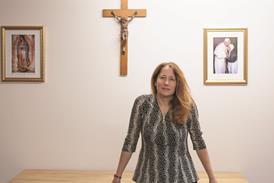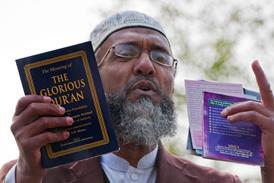If you’ve reached 60, you’ll know. You’ll know things change. You’ll know when you look in the mirror that you’ve changed. And you might also know that people look at you, and sometimes treat you differently.
In 1999 suicides among men over 85 in England and Wales rose by a staggering 40%. Believe it or not older men are now at greater risk of taking their own lives than male adolescents. Part of the reason for this is that British culture and society has stopped revering its elder members as it once did. Feeling ‘surplus to requirements’ is now a common complaint among over 60s.
But are Christians immune? Or has this subtle but potent shift crept into the church? Has ageism infected Christendom and do we now follow popular culture in defining and valuing people in terms of what they do rather than who they are? And, most importantly, what can be done to turn the tide and help churches better value their third-age members?
Retirees: A growing force
In 1880, every 20th person was retired. By the 1990s this had risen to every fifth person. By 2025 estimates suggest it will nearly be every third person.
This presents challenges on many fronts. For the Government there are pension payments, the NHS and social welfare provision. For churches it’s recognising that retirees have their own specific needs and abilities, and being willing to get creative in responding to these.
Although provision for youth in churches has mushroomed over the last decade, under-18s as a grouping are shrinking numerically. A decrease of 6% is expected over the next two decades. Ironically, third-agers, with their swelling numbers have been largely overlooked. Whichever way you look at it we’re in the early phases of an unprecedented social phenomena. And, writing as a church leader myself, I believe it’s one we must wake up to.
Diagnosing the problem
Finger pointing bears little fruit. So let’s all hold our hands up and accept we’re no more immune to stereotyping than the creators of characters like Victor Meldrew, Dot Cotton and Alf Garnett. A recent study confirmed the depiction of older people on TV and radio is less than flattering. In radio dramas, the elderly are rarely protagonists. Most appear as ‘nosey landladies, depressed alcoholics or extremely eccentric’.
The question this raises for believers is to what extent we are accepting these cultural stereotypes and allowing our view of old age to be shaped by them. Surely the Bible should be shaping our outlook?
Four key lessons can be drawn from scripture about the value of older people and our attitudes towards them:
- Care The biblical community owes a special duty of care to those who have experienced loss in their old age (Deuteronomy 26:12; 1 Timothy 5:3-10; Isaiah 1:17-23).
- Respect and value Old age is a blessing and older people must be revered and respected. In Old Testament times advanced years brought great power, honour, authority and privilege (Leviticus 19:32).
- Skills and gifts God does not favour old people. Neither though does he view age as a barrier to service. In Acts 2:17 the Spirit was promised to young and old. And, in the Old Testament, Abraham’s story started when he was 75. Moses was 80 when called to lead Israel and Anna the prophetess was 84 and still serving God.
- Problems and fears Spurgeon described Psalm 71 as the “prayer of the aged believer”. It gives expression to the fear of rejection and loneliness in old age. The Psalm highlights the need for the church to recognise and support retirees through these changes.
Ministry to the over 55s
But what does this look like within a church programme? Bramley Baptist Church, Leeds, is a family church with a thriving children’s ministry. They’ve taken the unusual step of appointing John and Jenny Boxwell, who are nearing retirement age themselves, as full-time Associate Pastors with a specific focus on the over 55s. The Boxwells’ strategy involves recruiting and empowering retirees in the church to visit and support others of that age. One such volunteervisitor, Isobel, is 82. Her response when approached by the Boxwells packs a powerful punch:
“Oh thank you so much. You see 20 years ago [when she was 62] I asked a previous minister what we older people could do. His reply was that we could always pray. Of course we could always pray, but I had hoped we could do more than that.”
On starting their work the Boxwells were challenged by the way retirees “seem to be invisible” despite being people of “wide and varied experience”.
They recognised that churches easily fail to use the latent talents of their retirees despite the fact that many retirees “actually feel the same as they did in their 20s” and are keen to get involved.
Holiday Clubs
Another example are holiday clubs for over 60s run by Will and Lynne Andrews. A full-time evangelist with outreach agency ‘Counties’, Will was concerned that “churches see the need and the opportunity but are often at a loss where to start” when dealing with ministry for retirees. He offers churches a two week programme incorporating events, crafts, seminars and activities for retirees, and travels around the country running these.
The Obsession with Youth
Inspiring as these stories are, salaried retiree workers, unlike youth workers, are scarce. Like adolescent teenagers retirees also experience acute changes and need support. Documented research points to six key areas in which the changes are felt most keenly:
- Loneliness
- Lack of care and respect by their family
- Loss, and its implications
- Lack of interest by the church
- Lack of state support
- Lack of influence
Churches now employ over 6,000 youth workers. The number of staff churches have employed to work with third-age workers is tiny. But why is this?
According to Doug Barnett who runs seminars on utilising retirees, “churches fail to see there is a future in third-age ministry. When the church invests in young people, it’s thinking about the church of tomorrow. It fails to understand there is also a future for older members. Sadly there is a subliminal message going round the wider church that older people are a burden and not a resource.”
A second reason is that popular culture has made youth cool. If youth could be packaged as a brand, it would sell like mobile phones. Even many 40- somethings now wear the clothes sported by their teenage children. Today’s cultural climate honours young not old. And the church, being rightly keen to plug itself into culture, has absorbed some of this thinking.
Thirdly, young people are leaving our churches – and perhaps the faith – at alarming speed. In 2001, research by Churches Information for Mission revealed that “teenagers and 20- somethings are massively under represented in church, while the 55-84 age bracket is over represented.” This crisis has meant resources have been channelled into youth work. However, a holistic, biblical vision of church requires all-age ministry and a committed focus to both young and old.
Who’s doing what?
In order to provide a snap shot of work being carried out among retirees, four main denominations, as well as the Evangelical Alliance were contacted:
The Church of England did some promising research in 1990. A working party was set up to look at aging in British society. It considered how people feel about growing older and what the church could do. Despite the fact that every fourth Anglican church-goer (25%) is over 60, no person or section at their headquarters has responsibility for retirees. In contrast, there are groups addressing almost every other conceivable age and interest group, from the National Youth Office to the Soldiers, Sailors and Airmen’s Housing Association. The list is long but doesn’t include retirees.
The United Reformed Church produced a report several years ago which led to the production of worship materials to help churches celebrate the contribution of older members. Little more was done however due to limited resources. The URC employ a specific youth and children’s coordinator, but no one to focus on work among retirees. This is concerning since research by Peter Brierley suggests that since 1989 the number of over 65s in the URC has increased by nearly 40%.
The Methodist Church has seen a 38% increase in over-65s since 1989, and appear to be very active among retirees. In 1999 the denomination established The Centre for the Spirituality of Ageing to “understand and highlight the spiritual needs of older people”. It offers resources and opportunities to leaders and retired people. While no specific person is responsible for over-60s work at Methodist HQ, various different groups such as the Methodist Homes for the Aged and The Women’s Network do pick up on these issues.
The Baptist Union of Great Britain have organised “Age to Age” conferences providing one-day consultation on work with older people. They do not however have any one person or section devoted to the work.
The Evangelical Alliance established the “Reaching Older People Network” – a coalition of groups working in the field – seven years ago. Booklets, games, activity ideas and lists of web sites were produced to help churches think through the issues. The vision statement spoke of the “urgency” of reaching older people with Christ. Sadly, that sense of urgency didn’t prevent the Network’s demise following the resignation of the person running it at EA central offices, and the death of the chairperson. Plans to relaunch have been talked about, but the fact the Network was allowed to lapse could be interpreted as a statement to the perceived importance of this work, particularly since it appears that no other groups in the EA have dissolved due to a resignation or death.
What can be done?
In his research, Peter Brierley identified that one of the two key reasons why retirees go to church is the relationship with the Minister. Many, however, are left disappointed. In a report for the Church and Society Committee of the United Reformed Church, Nigel Appleton found that, “the church has adopted an attitude of benign neglect towards the needs of the majority of older people”.
So what can be done to change this? The following list offers nine ways to begin redressing the balance:
- Survey all those over 60 in your church with a view to understanding their needs and what they enjoy. This will provide a foundation for any appropriate ministry based on what retirees actually need and enjoy – rather than what church leaders assume they need and enjoy.
- Look at the church vision/mission statement. It may include working with young people and families. Does it talk about supporting, utilising and learning from older members? Ensure your vision/mission statement is all-age friendly.
- Consider having a ‘Focus on the thirdage’ month. This could include:
- Pairing younger and older church members and encouraging them to meet for coffee, find out about each other’s history, family, employment, memories, housing, health and hopes. This will help destroy stereotypes on all sides, enable retirees to be known as individuals, not one homogenous group, and for support to be offered.
- Organise a joint youth and retirees meeting in which the different ages learn and try to understand the world of the other.
- Get the weekly house or cell groups to study scriptures and popularcultures views of old age, and how Christians should treat older brothers and sisters.
- Gear the sermons for the month to this subject – perhaps a four part series on people God used in their old age. Include practical application.
- Identify those who have a natural interest in work among retirees (they may be any age themselves) and actively encourage them in developing the work and empowering others in it.
- Set up knowledge-sharing groups in which retirees share the knowledge they have – about life in their youth, ways they have seen God work over a lifetime – and younger people share knowledge they have on issues ranging from what MSN and picture messaging are, to what it’s like to be a youth today.
- Appoint a working-party of interested people (all age if possible) to create genuine opportunities for retirees to make contributions in the church and community it serves.
- Consider following the lead of Twynam Chapel, Christchurch. They have divided all the over 60s into care groups, with oversight for each group given to a retiree with a passion for this ministry. The overseers then empower others and ensure all the people in their group are contacted or visited at least once a fortnight.
- Look at ways to empower and officially recognise the activities of evangelistic and pastorally minded retirees. Research suggests that many people turn to religion with renewed vigour in retirement. And remember – you will be a ‘retiree’ or ‘elderly person’ one day. Act while you have the chance to make an impact.
- Contact Will & Lynne Andrews regarding their holidays clubs for Doug and Sue Barnett have been involved in full time Christian ministry since the 1960s. Their work now involves training Christians to gear up, rather than slow down, for retirement.
“I saw a gap in the market”, says Doug. “The church wasn’t focusing on third-agers, and I was concerned that older people were being seen as a burden. We developed a series of seminars titled Don’t Retire Get Re-treaded. They deal with the past, encouraging people to look back and learn from it, but not to allow themselves to live in it or romanticise it. We consider eternity and talk about the need to lay plans and write wills as well as exploring skills in retirement and physical, emotional and spiritual fitness in old age.”
And their message to the Church? “Don’t fail to capitalise on the resource that’s there in your older community. The church will miss out on the lessons of God’s dealings over the years, if it doesn’t utilise the skills of retirees”.



























